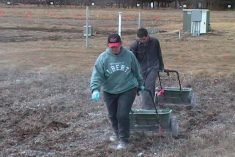Farmers, look after your teeth. Someone in a few thousand years might be checking them out.
That’s what archeologists have been doing to learn more about how farming spread to Stone Age Europe, setting the stage for the rise of western civilization.
“One of the big questions in European archeology has been whether farming was brought or borrowed from the Near East,” says T. Douglas Price, a University of Wisconsin-Madison archeologist who, with Cardiff University’s Dusan Boric, measured strontium isotopes in the teeth of 153 humans from Neolithic burials in an area known as the Danube Gorges in modern Romania and Serbia.
Their report published in the Proceedings of the National Academy of Sciences, draws on isotopic signatures of strontium found in the tooth enamel of people who died nearly 8,000 years ago, about 6,200 BC.
“The evidence from the Danube Gorges shows clearly that new people came in bringing farming and replaced the earlier Mesolithic hunter-gatherers,” says Price in a UW-Madison release.


















